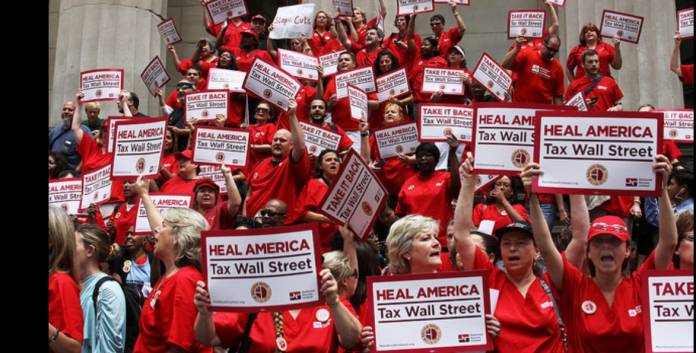
On April 26, 2017, the Healthy California Act (S.B. 562) was passed with a 5-2 vote at the Senate Health Committee hearing in Sacramento.
The Healthy California Act (HC), also referred to as single-payer health care or Medicare-for-All, would guarantee health care to all California residents, regardless of legal status, age, or employment.

Now if faces another test as it heads to the Senate Appropriations Committee Monday/22. That committee’s chair, Ricardo Lara, is the principal author of the bill.
Sen. Scott Wiener of San Francisco, who has said he supports the bill, is also on the committee. If two more Democrats on the seven-member panel vote for it, the measure will move to the Senate floor.
HC would offer a long-awaited alternative to our current healthcare system by eliminating premiums, deductibles, and co-pays. The plan includes comprehensive benefits and services, including all Medi-Cal, ACA, and CHIP benefits, which would be merged into the program through federal waivers.
Patients would be free to go to any provider of their choice without being slammed by surprise out-of-network bills. HC would also prohibit out-of-network providers from charging patients for the same services provided by HC, therefore encouraging health care professionals to join the program.
If HC succeeds, California might just deliver a solution to America’s historical health care conundrum: that Americans continue to pay exorbitant amounts for health care despite the fact that they are living in a wealthy, industrialized nation. According to the California Nurses Association, HC’s main sponsor, we pay 2.5 times more than OECD countries for health care, and yet have lower health outcomes. CNA also reports that about one-third of Americans can’t afford to visit the doctor,25 percent of Americans aren’t filling life-saving prescriptions because they are unaffordable, and the majority of bankruptcies continue to be caused by medical debt, even after the passage of the ACA.
This isn’t the first time California has tried to lead the nation in establishing a single-payer system–according to KPCC, a single-payer bill was first introduced in the state in 1994, only to be rejected by voters. Single-payer made two more comebacks in 2006 and 2008, but was rejected both times by then Governor Schwarzenegger.
The overall benefits of a single-payer system are well-documented. According to The Commonwealth Fund, in 2013, the U.S. spent nearly 50% more of its GDP on healthcare than France, and almost twice as much as the U.K. Private health spending in the U.S., including private insurance premiums, dwarfs spending in all other OECD countries by a factor of at least five.
A single-payer system would result in substantially lower healthcare costs and bring us on par with other high-income countries. For those of you worried about higher tax rates, a study released by UCLA reported that taxpayers are already covering 71% of health care costs in CA with public dollars, and about 31% of U.S. health spending is consumed by administrative overhead of insurance companies, according to PNHP. We’re paying for national health insurance, but we’re not getting it. And slightly higher taxes in exchange for no premiums, deductibles, co-pays, or wasted tax dollars on administrative costs sounds like a pretty enticing prospect.
In 2017, the push for single-payer resurrects at a tumultuous (and perhaps opportune) time. Republican Senators and Congressmen are diligently dismantling the ACA under President Trump’s command while California Democrats simultaneously have a supermajority in both houses of the legislature. With the public health nightmare that is the American Health Care Act, also known as “TrumpCare” or “RyanCare,” just barely passing the House as of May 4, 2017 and intended to replace the Affordable Care Act of President Obama, President Trump may have effectively set the stage for the Healthy California Act to succeed.
Trump’a AHCA is a monster of a bill–it eliminates the individual insurance mandate, cuts taxes on the rich and on medical device companies (resulting in a $275 billion tax-reduction over a 10-year period), and bans any spending on Planned Parenthood. It eliminates the cost-sharing provision offered under the ACA to defray out-of-pocket healthcare costs, like co-pays and deductibles, for people making between 100-250% of the federal poverty level. It also allows insurance companies to charge older people up to five times more on premiums than younger ones. According to PolitiFact, “A 64-year-old making $26,500 would be responsible for $14,600 in premiums under the American Health Care Act. With the Affordable Care Act, the same person would pay $1,700.”
The bill is enormously “state’s-rights” friendly. Under the AHCA, for example, states are “free” to charge people with pre-existing conditions much higher rates and impose a work requirement for Medicaid adults who aren’t pregnant, disabled, or elderly. The effects of this level of federal deregulation are easy to imagine–in a nutshell, they would be disastrous for the poor, elderly, and women and children, amongst other vulnerable populations, especially in very conservative states.
But what if California can take a progressive spin on this draconian bill? What if California can use these “freedoms” not to massively cut spending on crucial programs like pre-natal health and mental health, but to successfully implement the first-ever statewide single-payer health care plan? Well, we might just beat Trump at his own game.



Who would be eligible for this health care? How would this plan affect people who are eligible for health care through Medicare or Veteran’s Administration?
Also, “And slightly higher taxes in exchange for no premiums, deductibles,
co-pays, or wasted tax dollars on administrative costs sounds like a
pretty enticing prospect.”
Why would taxes increase if 31% of the present total cost now wasted will be eliminated? Isn’t that 31% more than enough to pay for premiums/deductibles/co-pays?
You can go to any doctor you want just pay out of pocket with your own money. Unfortunately in the United States we are forced to subsidize a government sanctioned oligopoly of insurance companies instead of having the option of being able to buy into a cheaper public health care system if we could.
I applaud this plan. I only wish Oregon would do the same.
Of course not. But if you stop asking dumb questions, you may get a shady spot in the rice field.
Credit to Shelia Kuel for starting this when not popular
If I like my insurance I can keep my insurance? And if I like my doctor I can keep my doctor?